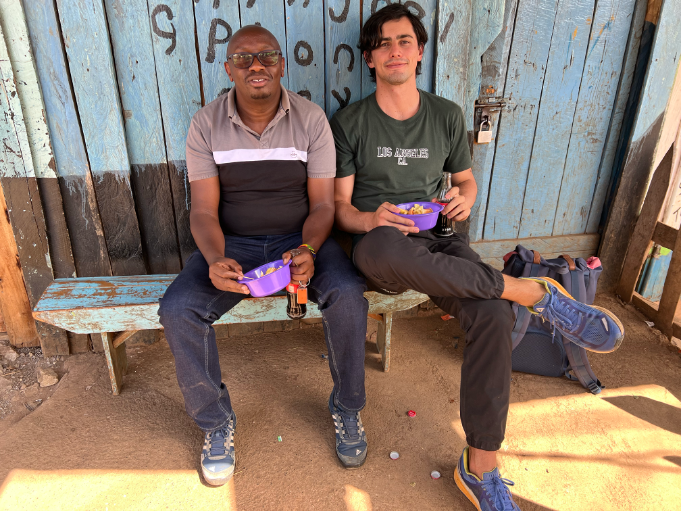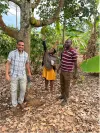Kyle Nielsen, our innovation consultant, has written several blogs detailing his experiences with smallholder farmers and data collectors. This time, he shares how important Acorn’s local partners are — on an operational scale, and a more personal one.
Exhausted in Kenya
My hotel was located on the main road in the middle of Kericho, Kenya. Checking in, I was led to my room next to the reception. Not close to the reception, and not near the reception — no. I became the unintentional assistant receptionist because my room was joined to the reception by a shared window.
After I assisted three guests with their check-in, I decided I would ask for another room. I had to pay the difference for the premium room — about 2 euros I think, and not even a discount after all the check-in work I helped with.
The premium room had a toilet seat (which was a bonus) but the exhaust of the generator was pointed directly into my window. The only thing better than the carbon monoxide putting me to sleep that night was the receptionist's reaction to my question about the exhaust.
“At least you have power?” she said.
Very true.
Relying on others
When travelling abroad, you usually feel out of your depth. New languages, traditions, currencies, spice or no spice, immigration officials that always want one extra paper to be filled in. Did I triple check the visa requirements? In any case, you're a visitor.
Having travelled to a few countries to meet scores of partners and people, there have only a been a few negative skirmishes. But what I realised through my travels, was the utter reliance I had on our local partners. The unsung heroes of our network.
All farmers in our programme belong to a support network that is ultimately managed by the local partners. My questions of where to sleep and eat were vital to my stay, but the questions of “How does agroforestry benefit me? Where do I buy the seedlings? How often do I prune? When do I prune?” are of far greater importance to the successful implementation of agroforestry than my temporary abode.
On the right: having a snack at the side of the road with Akvo’s Francis.


Trees for Kenya’s founder and CEO, Paulino Damiano.
Someone on the inside
David and Paulino (Trees for Kenya), Innocent (Kaderes), Francis (Akvo), to name a few, know thousands of farmers around their areas. They are the links to Acorn, and the wind in the sails of Acorn and proper agroforestry implementation practices.
Just finding a farmer to ground truth was difficult enough. I have the polygon, I see it on Google Maps, let’s just follow this road and visit him?
“Ha! We can go there, but only if you’re a goat. That’s a path, not a road.”
As we near the end of the year, on behalf of the Acorn team. I would like to personally thank our partners that help us make the world a little better, one seedling at a time. The local partners, cooperatives, Akvo, and many more.

Kaderes’ Innocent, reaching for a fruit with Peter Mwangi and Paulino Damiano
About Acorn
We help support smallholder farmers in developing countries transition to agroforestry. Together with local partners, we facilitate the funding and training needed by farmers to start their agroforestry transition. Transforming the sequestered CO2 through agroforestry into Carbon Removal Units (CRUs), we offer carbon credits to responsible corporates to help them reach their climate goals. The growth of the trees is measured with satellite imagery, AI and LiDAR, and certified by ICROA-accredited Plan Vivo.
With 80% of the sales revenue going directly to the farmers, it creates an additional income stream and helps them adopt a more climate-resilient way of farming that improves food security, biodiversity, and financial independence.
Get involved with Acorn
